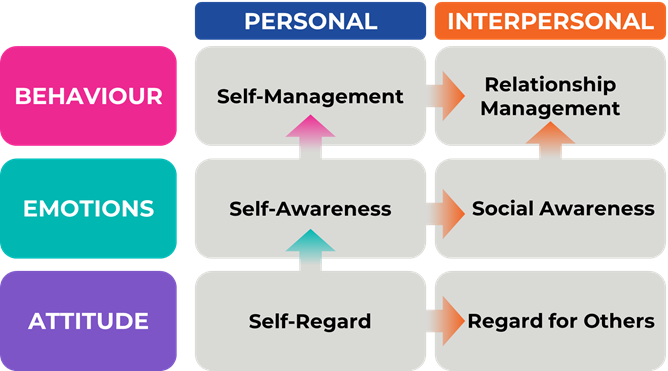What is emotional intelligence all about?
There have long been debates on the psychological abilities needed to thrive through change and complex situations, that there must be other skills involved than just those measured by IQ tests – ones that help build relationships, manage emotions and navigate social situations. Psychologists Peter Salovey and John Mayer were especially interested in the influence of emotion on cognition – do people think and behave differently when emotions are higher? They argued against traditional thinking that emotions lead to irrational behaviour, but instead proposed that understanding your own emotions and those of others may allow us to manage and adapt our behaviour in a positive way, and it is these skills they called ‘emotional intelligence’.
Salovey and Mayer’s (1990) research paper then presented a framework for emotional intelligence, a set of skills that enable us to perceive and manage emotion in ourselves and others, and use feelings to motivate, plan, and achieve in life. However, it was Daniel Goleman (1995) who brought the concept of emotional intelligence into the public consciousness, developing Salovey and Mayer's research into an accessible and bestselling book. Even now, emotional intelligence continues to receive a great deal of research attention, so how might this help us navigate life more successfully?
Insights from emotional intelligence workplace research
Findings from the large body of research into how emotional intelligence affects individuals at work suggest that emotional intelligence:
- plays a key role in promoting wellbeing and positive emotions (Zeidner, Matthews and Roberts, 2012)
- protects against emotional distress when faced with stressful situations (Gohm et al., 2005)
- preserves higher self-esteem and self-efficacy (belief in ability to control our own behaviour, emotions, and motivations), reducing influence of negative events and strengthening influence of positive events (Salguero et al., 2015)
- builds and supports close relationships, increasing availability of social support, which also improves wellbeing (Lopes et al., 2005)
- fosters positive coping strategies, such as expressing feelings and eliciting social support, instead of unhelpful strategies such as stewing over or avoiding (Matthews et al., 2006)
- is twice as important, for higher performance in every field, as cognitive abilities (e.g., Poon Teng, 2002).
- can be developed through relevant workplace training programmes (Mattingly and Kraiger, 2019)
Therefore, emotional intelligence abilities continue to be of relevance when navigating the challenging workplace.
Improving emotional intelligence through workplace models
The most influential models strive to take emotional intelligence research and bring it to the workplace to be applied as an everyday tool. It is possible to learn and develop emotional intelligence skills but takes practice: being able to notice and manage attitudes, emotions, and behaviour, whilst in a changing social context, is a continual process. Emotional intelligence is also reflected in what a person does in the present moment: it is something people do, not something they automatically are – it is about being emotionally intelligent.
Therefore, many models concentrate on three areas of emotional intelligence that can be improved: attitude (regard for ourselves and others), emotions (self and social awareness) and behaviour (self and relationship management). Thinking about these further, and how they interact together, may develop more skills to help with daily challenges.

Emotional intelligence is about attitude (self-regard and regard for others)
Self-regard is key to emotional intelligence, and is about respecting and accepting yourself, warts and all, feeling inner strength and self-confidence, plus positive attitudes towards work and life. However, often negative internal voices can bring in doubt (self-limiting beliefs) and drive thoughts and behaviour, leading to a poor and incorrect self-image (‘you will never be good enough; they are always against me’). These misguided attitudes often stem from childhood experiences. Understanding where our attitudes come from can help develop higher self-regard, recognising strengths and working on blind spots. This also facilitates higher regard for others (who also have self-limiting beliefs!).
There are several ways to develop more awareness of attitudes, see our ‘Reframing Self-Limiting Beliefs’ Article. Once we begin to develop this greater regard for ourselves and others, attention can be turned towards being more aware of our and others’ emotions.
Emotional intelligence is about emotions (self- and social awareness, and empathy)
Emotional intelligence is not about suppressing emotions, but involves noticing, labelling, and interpreting our emotions and the emotions of others. It is possible to learn to pay more attention to how we are feeling, and how these emotions influence responses, such as decisions made or interaction with others. Over time, this aspect of emotional intelligence facilitates greater empathy, which is more than just recognising how others are feeling, but also how we respond (social awareness). Empathy also helps develop greater understanding of other people’s situations. If we can work on being able to see things from another’s point of view (even if feel they are in the wrong!), not allowing disagreement to escalate into major conflict, we can get closer to finding a middle ground between opposing points of view.
Techniques such as mindfulness or ACT (Acceptance and Commitment Therapy) can help with this awareness (see further article suggestions below).
Emotional intelligence is about behaviour (self-management and relationships)
Emotional intelligence also involves managing our behaviour and doing the best we can, no matter the situation, e.g., being able to use all our intellectual capabilities, to behave in the best way under pressure, needs ability to manage emotions. This takes practice: once we become more self-aware, and identify and dismantle limiting attitudes and beliefs, it becomes possible to replace restrictive emotional behaviours with enhancing ones.
Emotions are also a particularly important social and adaptive function, increasing awareness of other people’s perspectives and needs, and how we interact with them. This enables greater openness, trust, mutual regard, and collaboration. By learning to listen more actively and ask questions that deepen insight, it is possible to demonstrate empathy and defuse conflict. Furthermore, paying much more attention to non-verbal communication may provide a deeper understanding of what others really think.
Taking some time to explore the interplay between attitudes, emotions and behaviours will aid better understanding of personal strengths and barriers to success. The Mind Tools video below may help with thinking about this, as may talking about emotional intelligence with a trusted work colleague, helping each other to develop further skills towards better relationships and wellbeing.
There are also further resources you may find useful in the Applying Psychology at Work Hub including:


Rate and Review
Rate this article
Review this article
Log into OpenLearn to leave reviews and join in the conversation.
Article reviews